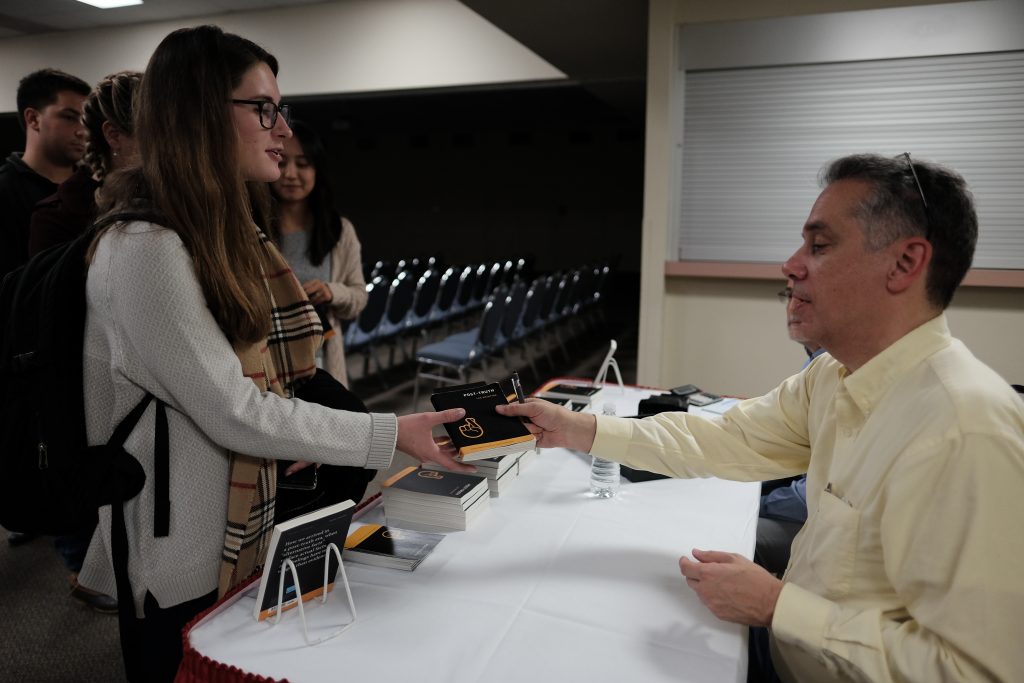
landscape at the Robison Lecture Monday evening. Photo by William Craine.
Boston University research fellow and author Lee McIntyre spoke about “fake news” at this year’s Robison Lecture on Monday.
Sara Netzley, associate professor of journalism and the chair of the Robison Lecture committee, first came across McIntyre when she was looking for books to use in her class about fake news.
“There is, in my eyes, an alarming trend of disregarding the truth, among some of our national leaders,” Netzley said. “As Americans, it is not healthy for our democracy. Making more people aware of it and the roots of it and how to identify it seems like a worthy goal.”
McIntyre has a philosophy background, but has published several works about truth and technology. His most recent book, “Post-Truth” was released this year and was named a “CNN Book of the Week.”
His book explores fake news, alternative facts and the impact they have on society. One important distinction McIntyre made between fake and factual news is the intent.
“Fake news is not simply news that is false,” McIntyre said. “Fake news is news that is deliberately false.”
McIntyre provided several examples of how fake news affects the world. He referred to an incident in December 2016, when an official of the Pakistan government threatened Israel with a nuclear bombing on Twitter after he read a fake news article about Israel threatening his country.
“Fake news almost started a nuclear war and you didn’t hear about it,” McIntyre said. “You know why you didn’t hear about it? Because it didn’t involve the U.S. and it was right after the election, so it was crowded out.”
Rachel Borland, a senior television arts major, said the speech from McIntyre was surprising.
“It was a very eye-opening lecture,” Borland said. “You hear about fake news almost everyday, but I never truly understood what a role it played in today’s society.”
McIntyre believes the development of fake news is not a new issue.
“I don’t think this phenomenon just sprang up overnight,” McIntyre said. “I think this is the inevitable result of several precipitating forces.”
McIntyre said there are two factors that go into the growth of fake news. First, he mentioned cognitive bias. An example of this is when people seek out news that confirms their own views.
“In these days, we don’t have to look very far,” McIntyre said. “Entire television networks and websites are built around telling us that our political biases are correct and shared by an enormous amount of other people.”
McIntyre said the rise of social media contributed to the increase of fake news in recent years.
“With blogs, tweets and other social media, people could now feed their desire for confirmation bias and free news without even bothering to patronize news sources,” McIntyre said. “With no form of editorial control over what’s now sometimes presented as news, there comes a perfect storm for fake news.”
McIntyre said it is difficult to distinguish the difference between real and fake news because of how they are delivered to us.
“We get the fake news and the real news side by side in electronically corrected format,” McIntyre said. “Can you tell just by looking which news sources are reliable?”
McIntyre did not pose an easy solution to fake news and said it may worsen.
“We have to be ready for things to get worse,” McIntyre said. “I wish I could end on a more positive note, but I am going to scare the hell out of you.”
McIntyre went on to show the crowd how new technology can manipulate audio and video to say whatever someone wants in real time.
McIntyre answered questions from the crowd and signed copies of his book after the lecture.




